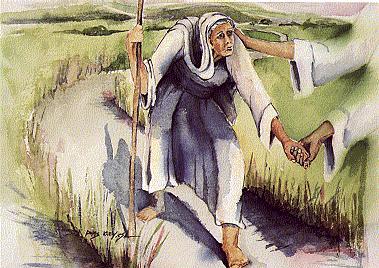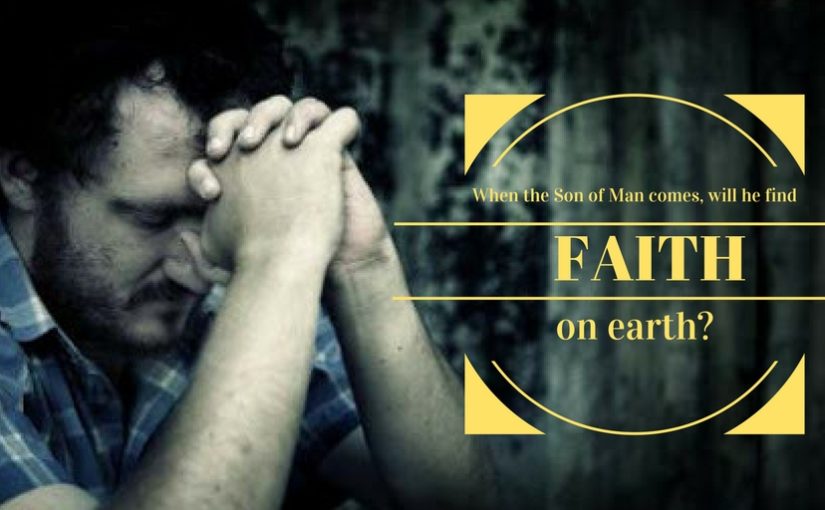Today’s readings
Prayer is one of the most important elements of the Christian life, of the life of a disciple, and yet it is also, I think, one of the most difficult to master. Still, it’s something that we work at every day of our lives, and the working it out should be one of our greatest joys. In today’s Liturgy of the Word, we have just one element of prayer, and that is the element of persistence in prayer.
Now I’m going to be real careful here. Lots of people give some lousy advice about prayer: if you just pray hard enough and long enough, everything will eventually work out all right. I’m not going to tell you that, because things often don’t work out perfectly no matter how much we pray, and they almost never work out the way we’d like them to. So why even bother praying? Well, hang in there, we’ll get to that.
We have a wonderful image of prayer in our first reading. I invite you to raise your arms with me if you’re able, and leave them raised until you can’t any more. This is what Moses had to do to keep the Hebrew army in a winning position against Amelek and his warriors. The minute Moses lowered his hands to rest, things went ill for the Hebrews, but as long as his hands were raised, things went okay.
Now, again, I proceed cautiously here, because I don’t think things always work out perfectly as long as we pray. But there’s an element of this analogy that is very important, I think. And that element is that sometimes it’s hard to be persistent in prayer. Sometimes you get tired. Maybe your arms are not yet weary, but they might soon get there.
I can think of a few times in my life when I’ve grown weary of praying. One of them was in my late thirties when I was trying, once again, and once and for all, to figure out what God wanted me to do with my life. I prayed and prayed and prayed, and it didn’t seem like God was answering at all. I finally grew weary of prayer and told God that he should give me a big challenge and whatever it was, I would do it. Then one day, the day of the Easter Vigil that year, I got a letter in the mail from a friend and it made everything crystal clear. Six months later I was in seminary.
Sometimes in our weariness we have to let go of what we think we would like God to do for us and just let God be God. Because praying isn’t supposed to be comprised of telling God what to do. But how are your arms doing? Are you weary yet? Well if so, you’re in good company. Moses found that to really be persistent in prayer, he needed friends – Aaron and Hur – to hold him up. That’s true for all of us, I think. There comes a point when we need to admit that we need friends to hold us in prayer, to take some of the burden of prayer when persistence has become difficult. If you haven’t already, you can put your arms down now.
Then what are we to make of the gospel reading? I mean, are we really supposed to think that God is an unjust judge who has no respect for anyone? Obviously not. I think that we’re supposed to see in this little parable that if even an unjust judge – one who neither fears God nor respects any person – if even that judge will eventually give in to the widow pleading for just judgment, well then how much more will our God who is infinitely just and doesn’t just respect us but loves us beyond all imagining, how much more will he pour out his blessings of justice on all of us?
Which isn’t to say that he will definitely answer our prayers the way we want them answered. Those persistent prayers will be answered in God’s way, in God’s time. He may say “no” or he may even allow something evil like an illness or some other disappointment. We may have to bear the burden of disease or the sadness of the death of a loved one. But in all of that, God will be with us. He may heal us in other ways, that we might come to know God’s love in the midst of our burdens.
When we persist in prayer, sometimes the change that happens is not the situation, but ourselves. We may grow in grace in some way that we would not otherwise experience or even expect. We may grow in our capacity to love, or in our awareness of the needs of others, or in our ability to be steadfast in the midst of chaos. All of these give honor and glory to God, which after all, brothers and sisters, is our ultimate purpose in life.
So let’s get back to that question that I asked at the beginning of the homily. Why even bother praying if we’re not going to get what we want? I think we pray for three reasons. First, we pray to grow in our relationship with God who is our friend. As in any relationship, we open ourselves up to conversation, watching for God’s response, accepting God’s will and his desire that we grow in love for him.
Second, I think we pray because God genuinely cares about us. If we are to grow in love, we have to know that he is open to us and desires that we communicate our needs, our hopes, our fears, our deepest longings to him. It’s not that he doesn’t know these things already, but the process of expressing them in prayer helps us to know those needs in deeper ways and helps us to be aware of God’s action in our lives.
Third, I think we pray because that’s how we grow in holiness. The more that we bind ourselves to God by receiving his mercy and grace and knowing his love for us in prayer, the more we become new people, new creations.
At the end of the Gospel today, our Lord asks, “But when the Son of Man comes, will he find faith on earth?” That’s an incredibly important question. So often it seems like the world, or even our lives, have gone horribly wrong. We may be upset about our country’s values, or the candidates for the upcoming election, or the seemingly constant wave of crime, terrorism, or natural disaster. But it’s important that we remember that we can’t stop praying about these things. If we ever want to see things change, we have to be people of faith. We have to persist in our prayer, even if we don’t see things changing as quickly as we would like. The Psalmist reminds us today that “Our help is from the Lord, who made heaven and earth.” Every prayer may not be answered in our time and in the way that we’d like. But by persisting in prayer, we will eventually and always become something better.







You must be logged in to post a comment.